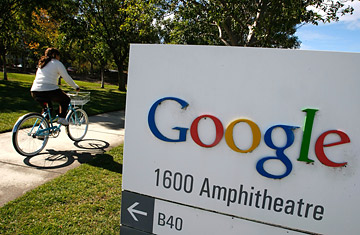
A Google employee rides a bicycle by a sign at the company's headquarters in Mountain View, California.
When Google (GOOG) reported earnings, earnings which were extraordinary during a poor economic period, for the first quarter, the company's chatty CEO Eric Schmidt said "Google had a good quarter given the depth of the recession — while revenues were down quarter over quarter, they grew 6% year over year thanks to continued strong query growth. These results underline both the resilience of our business model and the ongoing potential of the web as users and advertisers shift online." What he did not bother to mention is that no business model is any good at all without customers. Google has millions of clients spending money on its search advertising and its financial results are a signal that companies both large and small are not so hard up that they have completely abandoned marketing. Google's advantage may be that it is the most efficient medium to attract customers for many companies. (See pictures of Google Earth.)
But, you can't get blood out of a stone. Many economists have been concerned that the collapse of print, television, and internet display advertising is a strong indicator of how the broad economy is performing. Marketers in these media range from large drug firms spending tens of millions of dollars to small mechanic shops putting classified ads in the local newspaper. If all of these forms of adverting are down 25% to 35% it means that many, many businesses cannot even afford to invest in acquiring new customers. That, as much as any other sign, shows the depth of the recession's effect on businesses.
Google reported revenues of $5.51 billion for the quarter ending March 31, 2009, an increase of 6% compared to the first quarter of 2008. It is important to remember that the economy was considered to be in reasonable shape a year ago so Google's results in the period were based on a relatively robust business environment. Even with a collapse in the overall economy Google's results barely changed. The DJIA was 60% higher than it is now. Google's share price was only 15% higher. The market's perception of Google's prospects has changed very little in a year.
Since Google's sales operation is basically an auction system where companies come and bid on search terms, the fact that Google's revenue grew at all is not only a sign that marketers have money. It is a sign that competitors are willing to bid against one another to get the best results. A bidding system makes the buyer take a risk that by paying top dollar he can get a reasonable return. When millions of customers are willing to participate in that system to create demand for their products, the economy may be crippled but it is not by any means dead.
The other part of the Google results that are important is that the company's revenue compared to last year shows how quickly relatively successful businesses replace failing ones in a marketing system where the bidding for space goes on 24/7 and 365 days a year. If financial services companies are spending 50% less on Google, then some other industries are spending much more. If car firms have withdrawn all of their advertising budgets then companies that provide help to people with too much debt must have stepped up what they spend.
Google's results are more than just one set of very good numbers from one fairly large American company. Since Google may do business with more businesses than any other company in the world it is a nearly perfect indicator of the fact that firms will still have money to invest in marketing if they believe it is money well spent. It also means that as some sectors of the economy collapse there are others that are doing relatively well. Looking at the world through the lense of Google's earnings is encouraging.
— Douglas A. McIntyre
See the 25 best blogs of 2009.
For constant business updates, go to 24/7wallst.com.
